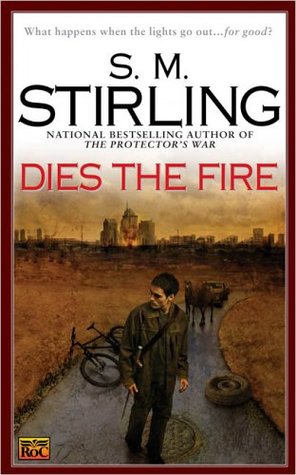 From Goodreads: Dies The Fire: A Novel Of The Change The Change occurred when an electrical storm centered over the island of Nantucket produced a blinding white flash that rendered all electronic devices and fuels inoperable. What follows is the most terrible global catastrophe in the history of the human race-and a Dark Age more universal and complete than could possibly be imagined. Reviews “Dies the Fire kept me reading till five in the morning so I could finish at one great gulp…”- New York Times bestselling author Harry Turtledove
From Goodreads: Dies The Fire: A Novel Of The Change The Change occurred when an electrical storm centered over the island of Nantucket produced a blinding white flash that rendered all electronic devices and fuels inoperable. What follows is the most terrible global catastrophe in the history of the human race-and a Dark Age more universal and complete than could possibly be imagined. Reviews “Dies the Fire kept me reading till five in the morning so I could finish at one great gulp…”- New York Times bestselling author Harry Turtledove
—
I was really excited to pick up this book. I loved the concept of it: set in 1998, the story revolves around an incident, some sort of electrical storm, that leaves the world without power … and renders all electronics and firearms useless (wait, what?).
The main characters have to figure out not only what is happening (is this local, city-wide or everywhere?) but also how long these conditions will last, and also, what or who caused this to happen and why?
I love a good mystery, so I was all about going along with the characters as they get to the bottom of this.
Except, here’s the thing: the book is so caught up in telling the story of survival (which I found greatly interesting for a very, very small portion of the 573-page book), that it doesn’t address the mystery itself to my satisfaction. Spoiler alert: we never (in this book, anyway) find out why this happened, who did it, and how long this will last. I was sorely disappointed.
Now, I will add there are other books in the series. And I heard somewhere that in one of the author’s other books, in a different series, the cause is alluded to. But I just don’t have it in me to trudge through 6 other books, or any other series, to find this out.
I found the idea of the story fascinating, but the action of the book was so repetitive that I grew bored with the story easily. I’m one of those who can’t put the book down even if it’s bad, and I was mildly interested in the characters for maybe the first half, but then after that it just felt like a chore to read.
The pluses of the book: seeing how people come together to form communities without a structured government or a way to communicate between towns. The concept itself was interesting: people with hand-to-hand combat or food-growing skills certainly fared better than others. Large cities fared the worst.
That said, the book sat on that topic for too long, without enough of the things that make it a page turner: give me more of a love story (there’s one, but it’s very slow moving and certainly didn’t keep my attention). More of a big-picture view. Don’t tell me the lights went out — and not ever address what happened!
Disclaimer: I don’t think I’m the target audience for this book. I have friends who read it and loved it. I also don’t get as excited about Renaissance festivals as the average fan.
Rating: 2 stars
